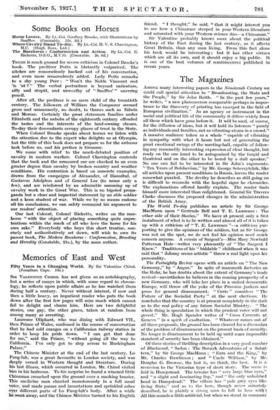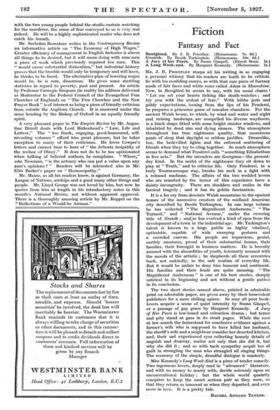The Magazines
AMONG many interesting papers in the Nineteenth Century we could call special attention to " Broadcasting, the State and
the People," by Sir John Reith. " In the past few years," he writes, " a new phenomenon comparable perhaps in impor- tance to the discovery of printing has emerged in the field of European civilization." As an agency or instrument in the social and political life of the community it differs widely from all those which have gone before it. It will be used, of course, for the diffusion of ideas, but it will hold its listeners " purely as individuals and families, not as vibrating atoms in a crowd." A massive audience taken as a whole " capable of vibrating in sympathy with what it hears but not of generating the great emotional swings of the meeting-hall, capable of follow- ing any reasonably interesting expression of clear thought, but ready on the one hand to be antagonized by the turgid and theatrical and on the other to be bored by a dull speaker." No one can fail to be interested in Sir John's arguments.
" Ten Years of Bolshevism," by Mr. George Soloveytchik, like all articles upon present conditions in Russia, leaves the reader somewhat puzzled. The devilry he describes as still going on is difficult to reconcile with the hopeful signs he chronicles. The explanations offered hardly explain. The reader finds himself more interested than enlightened. General Sir Travers Clarke discusses the proposed changes in the administration of the British Army.
The World To-day publishes an article by Sir George MacMunn upon " Gertrude Bell and T. E. Lawrence : The other side of their Stories." We have at present only a first instalment of what is to be written and almost all of it is taken up with a criticism of " T. E. Lawrence "—a criticism pur- porting to give the opinions of the soldiers, but as Sir George was not on the spot, we do not feel his opinion need much concern anyone. A cousin of Sargent's—Miss Mary Newbold Patterson Hale—writes very pleasantly of " The Sargent I Knew." Traditions of his " biddable " childhood when it was said that " Johnny seems artistic " throw a real light upon his personality.
The Fortnightly Review opens with an article on " The New Germany," by " Augur." In spite of mammoth factories on the Ruhr, he has doubts about the extent of Germany's trade revival—nevertheless he believes in the coming prosperity of a new Germany, who will take her place in a united democratic Europe, will throw off the yoke of the Prussian junket's and press for general disarmament. " Curio " considers " The Future of the Socialist Party " at the next elections. He concludes that the country is at present completely in the dark as to the real policy of any future Socialist Ministry. " The whole thing is speculation in which the prudent voter will not invest." Mr. Hugh Spender writes of " Cross Currents at Geneva " in a spirit of exaltation. " Whatever comes out of all these proposals, the ground has been cleared for a discussion of the problem of disarmament on the present basis of security. No longer is disarmament to be held up until some impossible standard of security has been obtained."
Of three stories of thrilling description in a very good number of Blackwood, " Sadon : The Berserk Adventures of a Subal- tern," by Sir George MacMunn ; " Ezra and the King," by
Mr. Charles Rawlinson ; and " Uncle William," by Mr. Douglas G. Browne, the last is, we think, the best. It is a reversion to the Victorian type of short story. The scene is .laid in Hampstead. The heroine has " very large blue eyes," and " a slight and fascinating lisp," and " the only unbobbed head in Hampstead." The villain has " pale grey eyes like living flints," and as to the hero, though never minutely described, he is plainly a strong man to fall in love witlt All this sounds a little artificial, but when we stand in company
with the two young people behind the studio curtain watching for the murderer, the sense of fear conveyed to us is very real indeed. He will be a highly sophisticated reader who does not catch his breath.
Mr. Seebohm Rovintree writes in the Contemporary Review an informative article on " The Economy of High Wages." dreater efficiency of management in English factories is above all things to be desired, but it will mean doing with nine men a piece of work which previously required ten men. This
would cause substantial dislocation," but industrial history proves that the trouble would only be temporary and will have, he thinks, to be faced. The alternative plan of lowering wages Would be, he is sure, disastrous. He gives some startling statistics in regard to poverty, past and present. An article by Professor Carnegie Simpson (in reality his address delivered as Moderator to the Federal Council of the Evangelical Free Churches of England) on " The Free Churches and the New Prayer Book" is of interest as being a piece of friendly criticism from outside the Anglican Church. It is answered under the same heading by the Bishop of Oxford in an equally friendly spirit.
A very pleasant paper in The Empire Review by Mr. Augus- tine Birrell deals with Lord Birkenhead's " Law, Life and Letters." The " too frank, engaging, good-humoured, self- revealing volumes " afford him great pleasure, but he takes exception to many of their criticisms. He loves Cowper's letters and cannot bear to hear of " the delicate insipidity of the recluse of Olney." It does not do to be too opinionated when talking of beloved authors, he complains. " Where," asks Newman, " is the actuary who can put a value upon any Man's opinions ? " Readers will be interested also in Mr. Ellis Barker's paper on " Homoeopathy."
- Mr. Maxse, as all his readers know, is against Germany, the League of Nations, airships and a good many other things and people. Mr. Lloyd George was not loved by him, but now he quotes from him at length in his introductory notes in this month's National Review, not without apparent approval. There is a thoroughly amusing article by Mr. Keppel on the
Reflections of a Would-be Airman."



















































 Previous page
Previous page